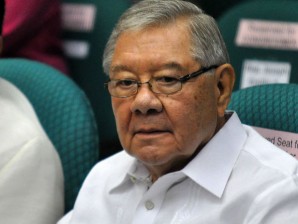House forms RH panel without hotheads
The House of Representatives on Wednesday moved to break the deadlock on the reproductive health (RH) bill by forming a panel without hotheads, but the Catholic Church hierarchy said the measure was “beyond redemption.”
Supporters and opponents of the measure will join the proposed informal technical working group to craft an acceptable version of the controversial population control bill with the participation of the executive branch and the Catholic Bishops’ Conference of the Philippines (CBCP).
“That is a good step, that we have a dialogue,” said Cagayan de Oro Representative Rufus Rodriguez after the decision was reached to form the group in a meeting presided by Speaker Feliciano Belmonte.
He also said lawmakers agreed that the hard-liners would not be included in the informal working group, only moderates.
Rodriguez said Belmonte told the lawmakers that before the bill was tackled on the floor, proponents would be given prior notice so no one would be caught unawares. Tempers flared on Tuesday when the question of quorum was raised after an effort was again initiated to introduce changes to the bill following weeks of delays because of privilege speeches.
“There will be lesser tension and the rules are very clear, no discussion of RH until everybody is informed it will be taken up. So there would be no surprises. We won’t have any more fireworks in the plenary,” Rodriguez told reporters.
About 15 lawmakers, consisting of House leaders and staunch critics of the measure, attended the meeting over the reproductive health bill yesterday. The meeting was “cordial,” according to Cebu Representative Pablo Garcia.
During the meeting, the authors of the measure presented their proposed amendment, which was to limit the provision of contraceptives to the poorest of the poor as identified by the social welfare department’s National Household Targeting System.
But the critics of the bill remain concerned. Rodriguez said he did not want the government to use public funds to buy contraceptives, while Minority Leader Danilo Suarez said there was no need for the bill, and that the budget for contraceptives should be taken from the conditional cash transfer fund.
No consensus yet
Majority Leader Neptali Gonzales II said while no consensus about the bill’s latest incarnation was reached yesterday, at least, lawmakers from both sides of the divide were talking.
“The speaker just wants that there would be a basis for discussion,” he said.
At any rate, Gonzales said the House could not tackle the bill this month because it would be busy with the 2013 budget.
The RH bill had been a heated topic in the House, with no end in sight to the debate, until President Benigno Aquino personally implored lawmakers during a lunch meeting in Malacañang last month to proceed to the period of amendments to get the measure enacted swiftly.
On Tuesday night, tension rose again in the plenary when Rodriguez flared up over the declaration of a quorum just as Pangasinan Representative Kimi Cojuangco was to deliver a privilege speech on the subject although the bill was not scheduled to be discussed.
Rodriguez, in a loud voice, said the secretariat was wrong and that there was no quorum on the floor. As Rodriguez was shouting, Gonzales moved to adjourn the session, later telling reporters that he did not want to deal with Rodriguez.
Beyond redemption
Fr. Melvin Castro, executive director of the CBCP Episcopal Commission on Family and Life, said Church officials were wary of participating in the informal panel.
He said critics, especially those in favor of the RH bill, might construe it as a form of compromise on the family planning measure.
If cooperation from the Church was needed, Castro said the CBCP would most likely let lay experts present the bishops’ position to the panel.
“We would like to leave it to the anti-RH lawmakers to get their wisdom into this new development in Congress,” Castro told reporters. “If at all, it should be our lay experts but not priests or bishops … as of now, that’s what I know,” said Castro.
“Our worry is that if the bishops or priests attend, they might say that we are already compromising so that’s what we are avoiding because we don’t know what is going to be the dynamics of that technical working group,” he said.
He maintained that the Catholic Church was standing by its objection against the RH bill even as its proponents said they were open to amending the provisions of the measure.
“Our position is that the RH bill is beyond redemption,” Castro said. “Our position is still to reject the bill in its entirety.”
Palace upbeat
Presidential spokesperson Edwin Lacierda welcomed moves in the House to push the measure forward after a decadelong delay. “We are hopeful that an RH bill acceptable to a greater segment of the population will be approved,” he said in a Malacañang briefing.
Lacierda welcomed the move to exclude the hotheads from the deliberations of the panel.
“That’s a good suggestion coming from Speaker Belmonte. That’s why we’re saying we hope that reasonable men and women come together and discuss the amendments to the RH bill since this is already the period of amendments,” he said.
Given the lengthy debate, only House leaders could say if the bill would be approved within the year, Lacierda said.
